Your dream home improvement is finally complete! The contractors have packed up and left and you’re now enjoying your new outdoor space. Moving forward, it’s important to know how to maintain this new project. With heavy foot traffic and environmental circumstances, how do you ensure your landscape stepping stones and pavers stay in tip-top shape for years to come? Keep reading to discover our tips to properly maintain your stone walkway.
1. Consistent care and maintenance
The general maintenance of your stone walkway is minimal, but significant. Certain environmental circumstances may involve some additional care and maintenance but being consistent with the little upkeeps avoids more elaborate maintenance of your garden path in the future. Remember that concrete is porous. When the leaves begin to fall, sweep them off your stone steps to avoid organic stains. When you see dirt on them, take a few minutes to hose it off and keep them clean. When the snow melts, a thorough, overall spring-cleaning using a pressure washer and a light product shampoo or dishwashing soap works best to get your natural stone look-alike pavers ready to enjoy all summer long. The key to graceful aging is consistency!
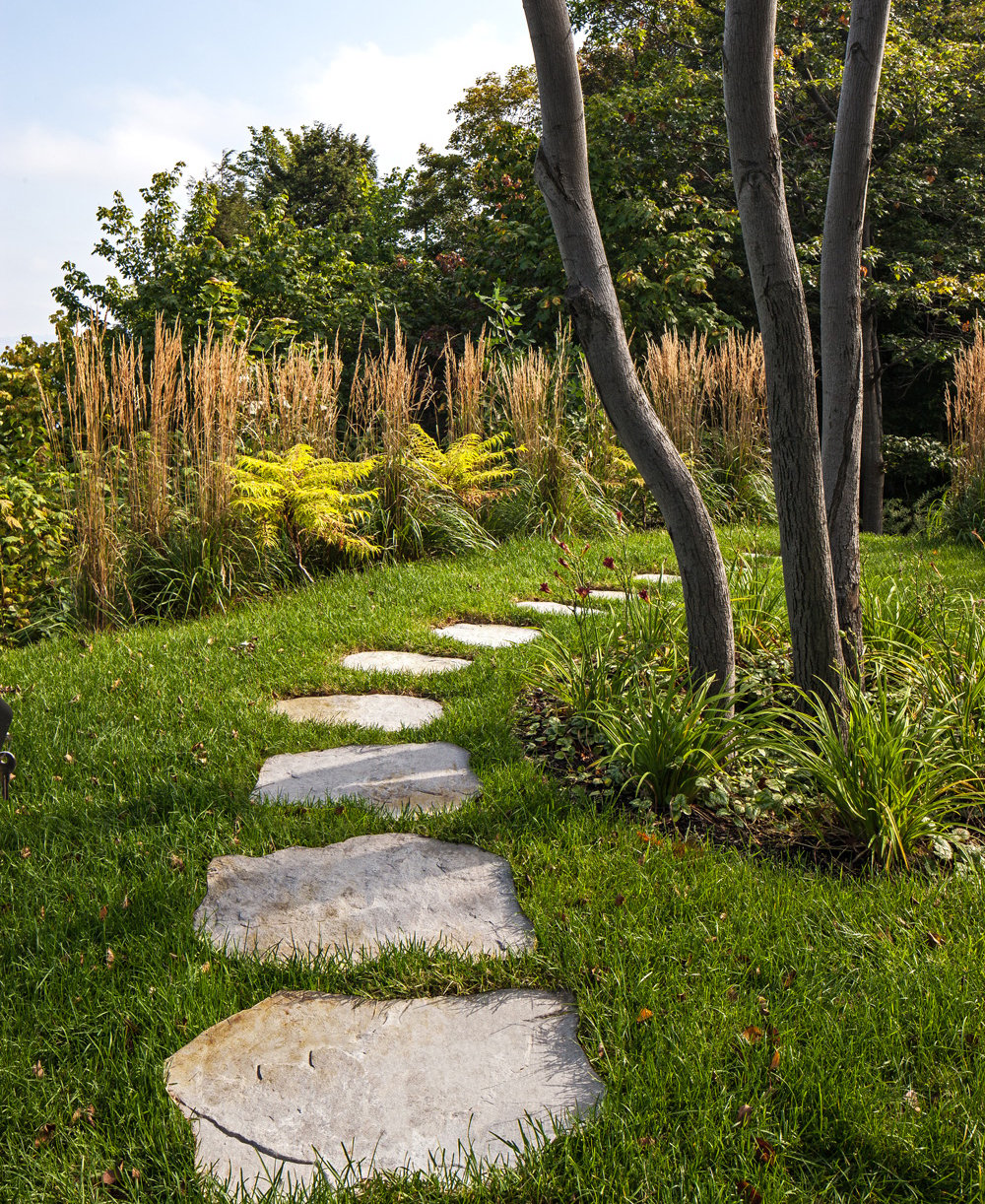 Featured product: Maya stepping stone
Featured product: Maya stepping stone
2. Food and beverage spills
Who hasn’t spilled a little wine at a dinner party? If one of your guests has a little accident with wine or food, don’t panic! These accidents should be rinsed off with warm water right away. Liquid dish soap or laundry detergent will remove most food and beverage stains on natural stone look-alike pavers. Mix a solution of the soap or detergent with warm water and gently brush the stain away with a cloth or soft-bristled brush that has been dipped into the mixture.
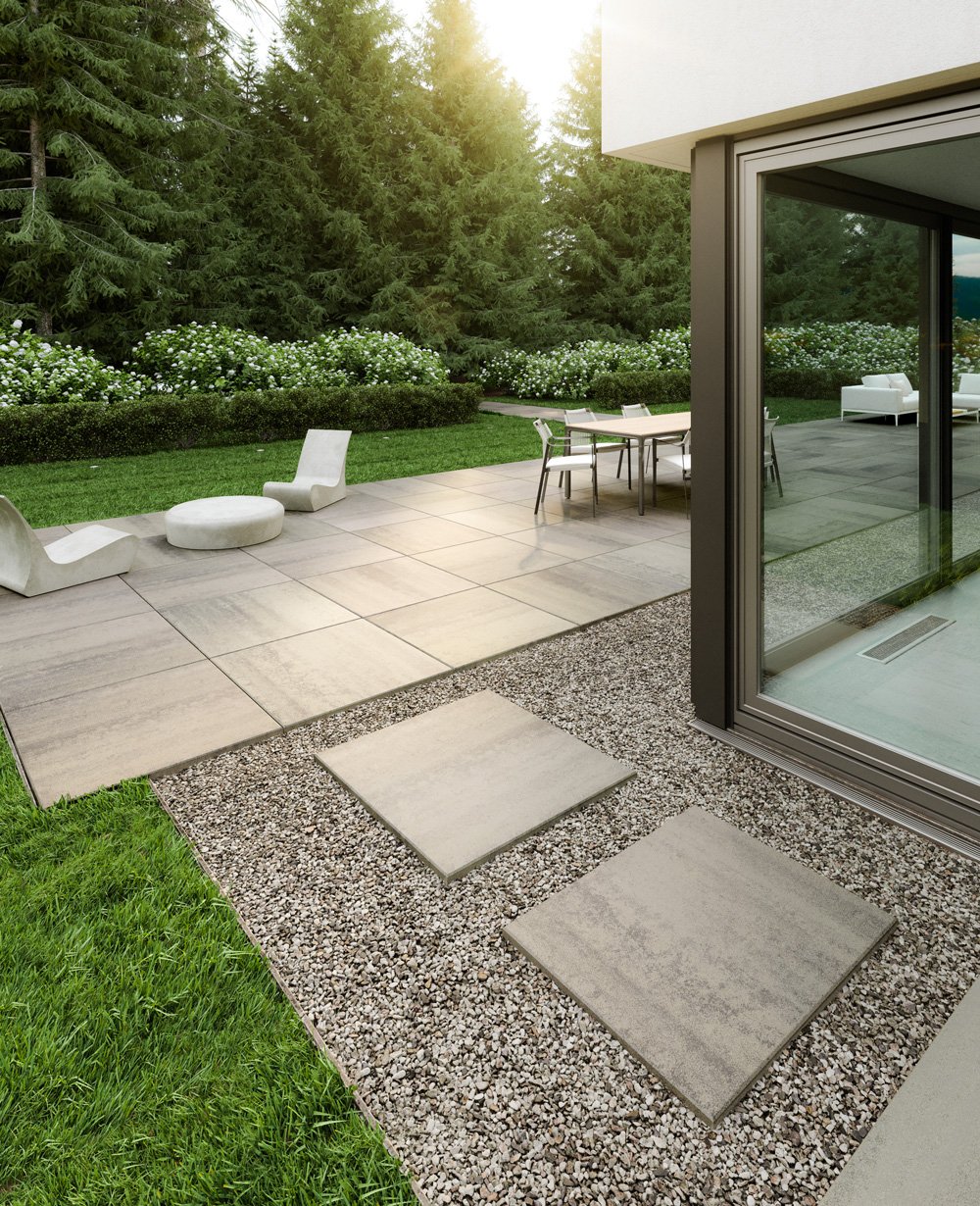 Featured product: Industria 900 paver
Featured product: Industria 900 paver
3. Oil and Grease stains
Oops! Some oil or grease stains are starting to appear on your stone steps or pavers and you don’t know what to do? We have the solution! Light oil and grease stains can generally be removed with an application of liquid dish soap. Directly apply the soap to your stone walkway and let sit for 20-30 minutes, scrub with a nylon brush and rinse with hot water. Re-apply and repeat until the stain is removed. If it is a fresh stain, lightly rub the area with a clean rag or paper towel. If an area is heavily soiled, a professional product such as Gator Oil and Grease Removal may be used.
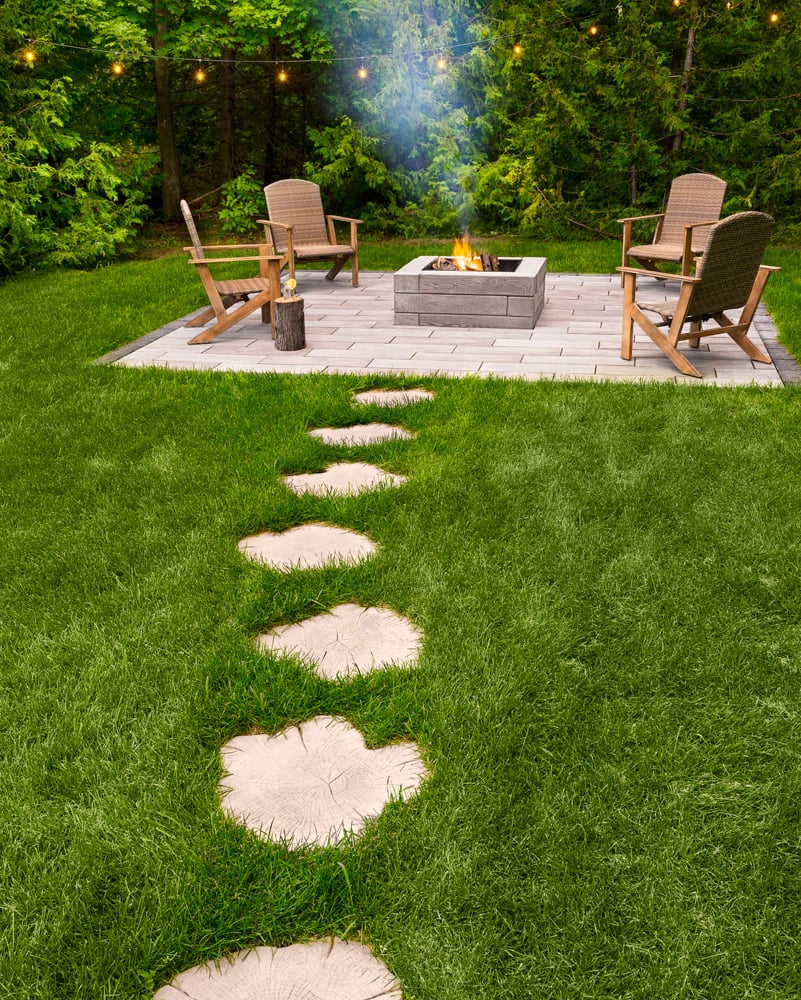 Featured product: Borealis stepping stone
Featured product: Borealis stepping stone
4. Rust be gone
Noticing some rust beginning to form on your garden path? This happens to many of us! In fact, some fertilizers contain iron that can leave stains on the surface of your landscape stone steps. After spreading lawn or plant fertilizer, be sure to sweep the surface of your pavement to prevent rust spots. Rust stains from steel, fertilizer or high iron content water can be removed using professional products such as Gator Rust Remover.
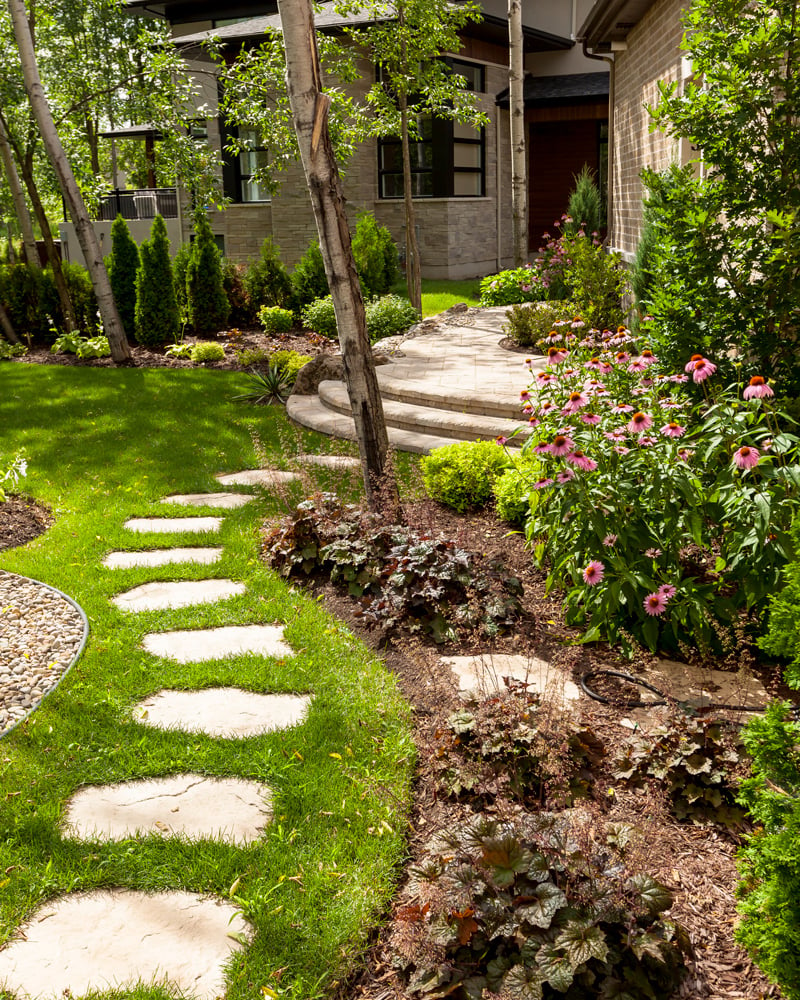 Featured product: Maya stepping stone
Featured product: Maya stepping stone
5. What products to use... and which ones to avoid
Different cleaners are sold for different purposes. For maximum results, be sure to use the right professional or properly diluted household products. We recommend Alliance Gator or Flexlock hardscape cleaning products. If you choose to use an industry cleaner to clean your stone walkway, be sure to read and follow the labels carefully. Avoid wire brushes and strong acids like sulfuric and muriatic, as these can do serious damage to your stone steps. Acids should be limited to professional use only. When using a pressure washer, make sure that it is a low-pressure unit (1700-2000 psi) and that the nozzle is a fan tip. Be sure to spray at least one foot away from the surface at a 45 degree angle.
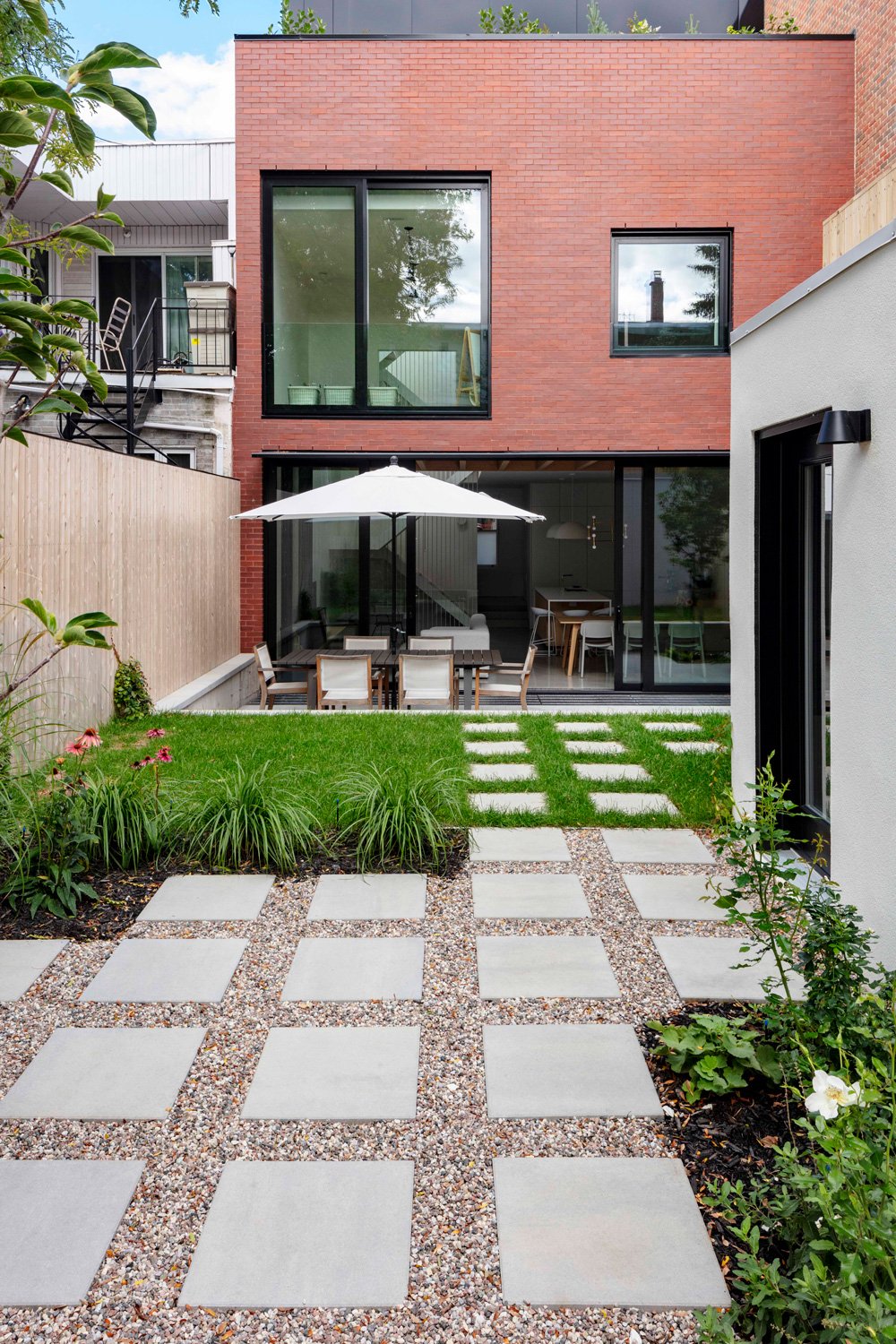 Featured product: Industria 600 slab
Featured product: Industria 600 slab
6. Seal the deal
Depending on your environment, it may be a good idea to consider sealing your stone walkway area. Sealing will not prevent stains but will make it a lot easier to clean them off. Think of it as a protective barrier. The stain sits on top of the sealer instead of penetrating into the concrete. For example, if you’re in an area where there are many trees, more leaves will fall onto the stone steps, possibly resulting in more organic stains forming over the seasons.
Sealing your garden path can help improve their beauty much like waxing a car. Doing so can also make the product more stain-resistant and easier to keep clean. However, the quality of Techo-Bloc products is not compromised if they are not sealed.
The best paver sealers help lock stones in place and help pavers look their best over time. Not only does a sealer protect your pavers, but by penetrating deep into its surface, sealers prevent dirt, insects and other debris from settling into the material. They also prevent grass, weeds and moss from growing inside the joints. Protecting your pavers is an important step when completing a successful, landscape project.
How do you choose a stone sealer? Well, you can first determine the finish you’d like for your landscape project. In fact, different sealers offer different finishes, such as wet and dry. Solvent-based sealers offer a thicker, higher gloss appearance, whereas water-based sealers offer a drier finish. Sealers for a wet finish will make your pavers look darker, as though it has just rained, whereas sealers for a dry finish will keep your pavers looking authentic, how you chose them.
 Featured product: Blu Grande Smooth patio slab
Featured product: Blu Grande Smooth patio slab
UV Resistance
Another aspect to keep in mind, is to choose a sealer that offers comprehensive UV resistance, like Acrylic stone sealers and Hybrid polymer sealants. What does UV resistant mean? It refers to the capability not to degrade or alter in the presence of UV. This resistance is important, especially in outdoor applications, since pavers are exposed to direct sunlight every day. UV fades color. Have you ever noticed how a picture fades when exposed to the light over time? The same thing happens with pavers. This UV resistant sealer will ensure that the color of your paver won’t fade over time, due to accumulated sun exposure. It guarantees your pavers look as good as new as time goes on.
Consider Porosity
When choosing your sealer, it is also important to consider the porosity of your pavers, as it will determine which sealer you use. In fact, applying sealer isn’t a one-size-fits-all. In fact, applying coats of the wrong sealer will look fine for a short period of time, but your porous paver will end up absorbing the sealer. Before you know it, your pavers will look dull and unsealed. Not sure if you have a porous surface on your hands? Ask your contractor or conduct a field test. First, pour some water on your pavers. If the water is absorbed almost immediately, you’re dealing with a very porous surface. If the water remains on the surface for more than 30 seconds, your surface is less porous. Depending on the situation, the correct sealer must be chosen. Ask your contractor or visit a local dealer to find the correct sealer for your surface!
Non-Slip Sealers
If you’re installing pavers by a swimming pool or a wet area, might we suggest using a non-slip sealer? These stone sealers are designed to penetrate through the concrete surface where they chemically react within the pores. The non-slip sealer creates traction reducing the slipperiness of the surface when wet. Not to worry though, a non-slip sealer will no change the surface characteristics of the concrete!
7. Winter Care
For those of us who live in colder climates, there are a few tips to keep in mind when maintaining your stone walkway.
First of all, de-icing salts should be applied sparingly on areas that have snow or ice only (never directly on the product as this can damage the stone steps over time). Do not use products that contain a blend of chemicals.
Furthermore, when using a contractor for snow removal, it is recommended to verify that their equipment uses Teflon blades to avoid scratching the natural stone lookalike pavers. For permeable pavements, it is not recommended to use traction aid grit (for slip/skid resistance) as they can scratch the surface of the stone walkway.
When preparing your garden path for the winter season, keeping your products equally exposed to the elements is important. For example, a pool cover installed over a portion of the pool deck (i.e. pool coping and first few feet of paved surface) for months at a time will affect the product’s exposure to light, the elements, dirt and debris. This may result in a difference in appearance over time. Uniform exposure to the elements will keep your home improvement project looking great for years to come.
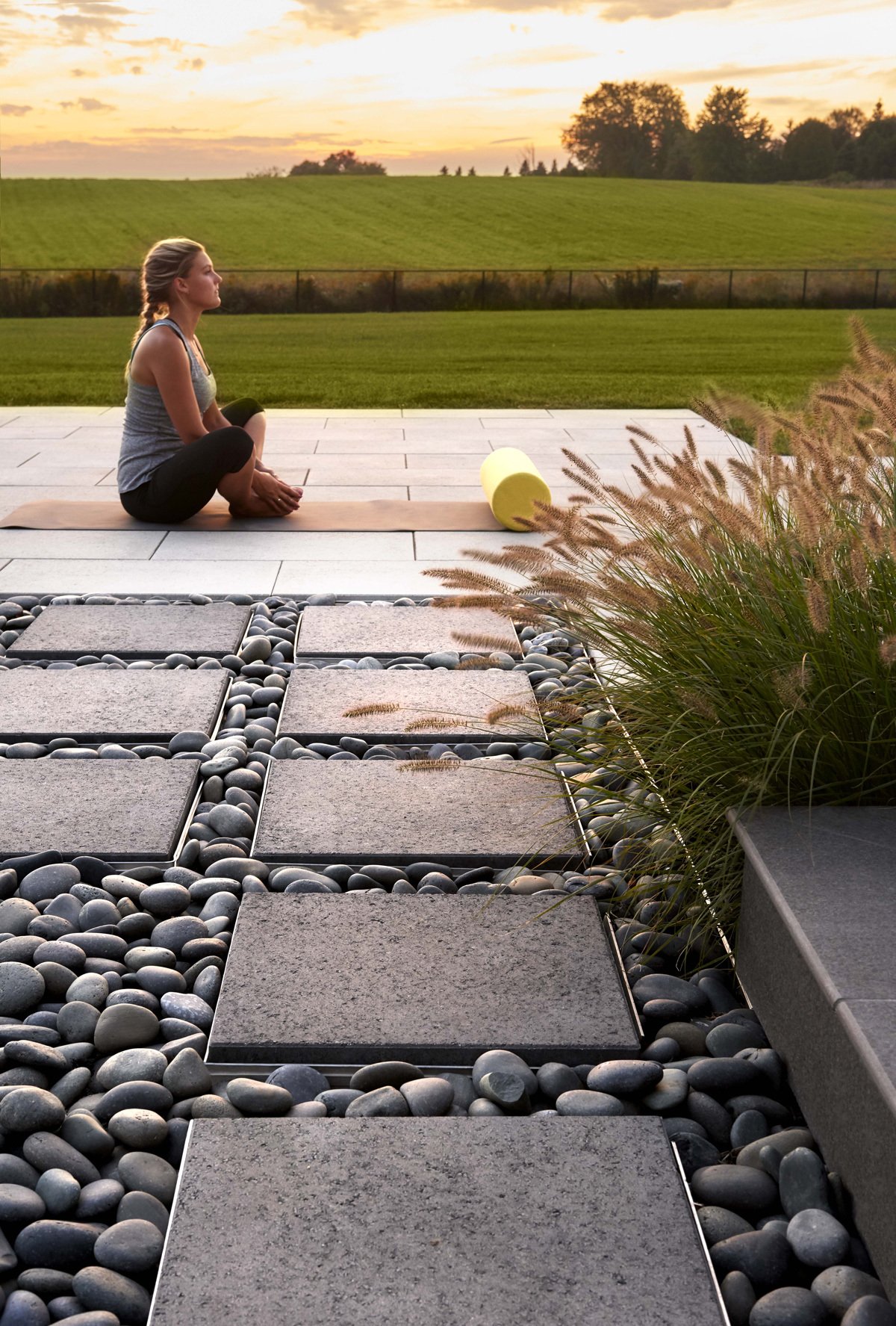 Featured product: Para patio slab
Featured product: Para patio slab
As you can see, a home improvement project, like almost everything in life, requires care and maintenance over time. The key here is consistency. If you apply these six steps consistently throughout the years, your stone walkway will continue to look like you just had it installed last week!
For more detailed information about care and maintenance, check out our Care and Maintenance Guide.



Leave A Comment